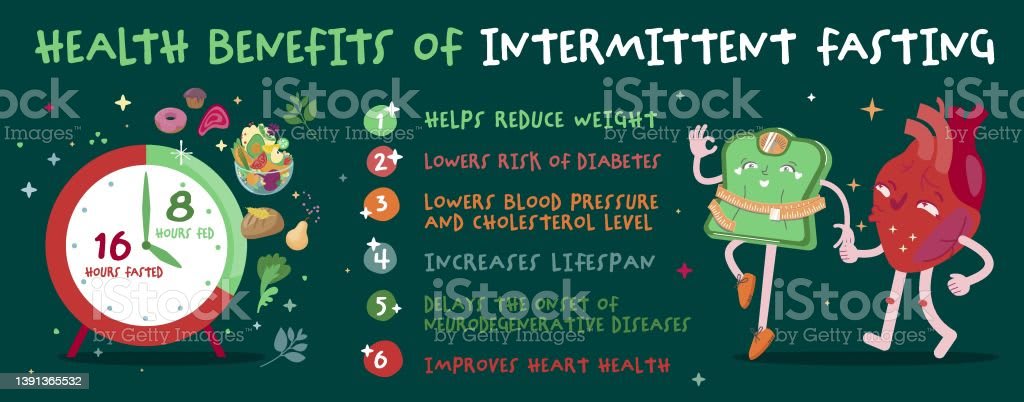Health benefits of intermittent Fasting
Weight Loss

1. Introduction
• Definition of intermittent fasting
• Purpose of intermittent fasting
2. How Intermittent Fasting Works
• Role of glucose and glycogen
• Fat burning during the fasted state
3. Health Benefits of Intermittent Fasting
• Weight loss
• Lowering blood pressure and cholesterol
• Prevention and control of diabetes
• Improved brain health
4. Impact on Insulin Levels
• Insulin's role in glucose regulation
• Constant high insulin levels and insulin insensitivity
• Fasting and reduced diabetes risks
5. Effect on Brain Health
• Similarities between fasting and exercise
• Neurotrophic factors and neuronal growth
6. Who Should Not Attempt Fasting
• Children and teens
• Pregnant or breastfeeding women
• People with certain medical conditions
7. Safe Approaches to Intermittent Fasting
• 16-hour fast with an 8-hour eating window
• Importance of balanced meals and good nutrition
• Hydration and knowing physical limits
8. Breaking the Fast and Avoiding Overeating
• Slowly reintroducing food after fasting
• Avoiding unhealthy food choices
9. Conclusion
• Recap of the benefits and considerations of intermittent fasting
10. FAQs
• FAQ 1: Is intermittent fasting suitable for everyone?
• FAQ 2: How long does it take for the body to start burning fat during fasting?
• FAQ 3: Can intermittent fasting help with weight loss?
• FAQ 4: What are the potential risks of fasting?
• FAQ 5: What is the easiest approach to intermittent fasting?
Intermittent Fasting: A Powerful Tool for Weight Loss, Health, and Well-being
Intermittent fasting refers to eating plans that alternate between fasting and eating periods. The goal is to systematically starve the body long enough to trigger fat burning.
Introduction
Intermittent fasting has gained significant attention in recent years due to its potential benefits for weight loss and overall health. This article explores the concept of intermittent fasting, how it works, its health benefits, and important considerations.
How Intermittent Fasting Works
During a meal, carbohydrates in food are broken down into glucose. Glucose absorbs through the intestinal wall into the bloodstream and is transported to various organs, where it serves as the major energy source. Excess glucose is stored for later use in the liver and adipose tissue, in the form of glycogen and fats.
In between meals, when the body is in the fasted state, the liver converts glycogen back to glucose to keep supplying the body with energy. Once the reserve of glycogen in the liver is depleted, the body taps into energy stores in adipose tissues. This is when fats are broken down into free fatty acids, which are then converted into additional metabolic fuel in the liver. Thus, if the fasted state lasts long enough, the body burns fat for energy and loses that extra fat. Losing the extra fat is translated into a range of associated health benefits.
Health Benefits of Intermittent Fasting
Intermittent fasting, when done correctly, has been linked to numerous health benefits. One of the primary benefits is weight loss. By creating a calorie deficit during the fasting period, the body turns to stored fat as an energy source, resulting in weight loss over time.
Additionally, intermittent fasting has shown promise in lowering blood pressure and cholesterol levels. This can help reduce the risk of cardiovascular diseases and promote heart health.
Another significant benefit of intermittent fasting is its potential in preventing or controlling diabetes. Constant high insulin levels, which occur with frequent eating throughout the day, can lead to insulin insensitivity, a hallmark of prediabetes and type 2 diabetes. Fasting helps keep insulin levels low, reducing the risks associated with these conditions.
Moreover, intermittent fasting has been found to have a positive impact on brain health. Fasting challenges the brain in a similar way to physical or cognitive exercise. It promotes the production of neurotrophic factors, which support the growth and survival of neurons. This can enhance cognitive function, improve memory, and potentially reduce the risk of neurodegenerative diseases.
However, it's important to note that fasting is not suitable for everyone. Certain groups should avoid attempting fasting, including children and teenagers, pregnant or breastfeeding women, individuals with eating disorders, type 1 diabetes, advanced diabetes, or other medical problems, as well as those who are underweight or frail. Fasting can also be unsafe if overdone or not done correctly.
There are several approaches to intermittent fasting, but one of the easiest and most sustainable methods is the 16:8 fasting protocol. This involves fasting for 16 hours and restricting the eating window to 8 hours each day. This can be achieved by skipping breakfast and having the first meal later in the day.
For intermittent fasting to be safe and effective, it must be combined with balanced meals that provide good nutrition. It's crucial to ensure that the body receives all the necessary vitamins, minerals, and macronutrients during the eating window. Staying hydrated is also essential during fasting periods, as water plays a vital role in various bodily functions.
Breaking the fast gradually is important to avoid discomfort or digestive issues. It's recommended to start with light, easily digestible foods and gradually reintroduce regular meals. Overeating after a fast, especially indulging in unhealthy foods, should be avoided as it may negate the benefits of fasting and hinder weight loss goals.
In conclusion, intermittent fasting can be a powerful tool for weight loss, overall health, and well-being when done correctly. It has the potential to aid in weight management, lower blood pressure and cholesterol, prevent or control diabetes, and improve brain health. However, it's essential to approach fasting with caution and consult with a healthcare professional if there are any underlying medical conditions. By combining intermittent fasting with balanced nutrition and healthy habits, individuals can unlock the benefits of this eating pattern.
FAQs
FAQ 1: Is intermittent fasting suitable for everyone?
No, intermittent fasting is not suitable for everyone. It should be avoided by children and teenagers, pregnant or breastfeeding women, individuals with eating disorders, type 1 diabetes, advanced diabetes, or other medical problems, as well as those who are underweight or frail. It's always best to consult with a healthcare professional before attempting intermittent fasting.
FAQ 2: How long does it take for the body to start burning fat during fasting?
The body typically starts burning fat for energy once the glycogen stores in the liver are depleted, which can take approximately 10 to 12 hours for an inactive person. However, individuals who exercise may enter the fat-burning state more quickly.
FAQ 3: Can intermittent fasting help with weight loss?
Yes, intermittent fasting can be an effective strategy for weight loss. By creating a calorie deficit during the fasting period, the body turns to stored fat as an energy source, leading to weight loss over time.
FAQ 4: What are the potential risks of fasting?
Fasting can be unsafe if overdone or not done correctly. Some risks include nutrient deficiencies, low blood sugar levels (especially for individuals with diabetes), dehydration, and potential adverse effects for individuals with certain medical conditions. It's important to approach fasting with caution and seek guidance from a healthcare professional.





Comments
There are no comments for this story
Be the first to respond and start the conversation.